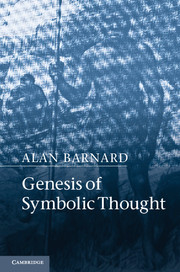8 - Conclusion
Published online by Cambridge University Press: 05 August 2012
Summary
In the closing lines of Social anthropology and human origins (Barnard 2011: 151), I argued that social anthropology ought to be involved in trying to understand prehistory. A branch of social anthropology specializing in human origins is possible. Although one reviewer seemed to think I was arguing that it should swallow up the whole of human origins studies, that was not my intention. Rather, social anthropology should make its contribution where it best can: and there is a great deal it can say about the genesis and spread of symbolic thought, much more than can be said about social life in any other period of prehistory except for the Neolithic and since. This short chapter will summarize what I have argued. More importantly, I want to look forward to other areas of engagement with archaeology and linguistics, especially with regard to the time frame of symbolic thought and culture.
Disciplinary boundaries
At the risk of getting raked over the coals, I would like each of us in the study of human origins to think about our bread-and-butter occupations and to reflect on how these relate to the bigger questions of the wider anthropology. Who is likely to have the most insight into human origins? Someone who . . .?
dissects brains
measures fossil femurs
scrapes dirt off cave floors
coaxes strangers to spit into plastic vials
observes chimps and collects their dung
gets students to play ‘Chinese whispers’
befriends foreigners and asks them silly questions
Information
- Type
- Chapter
- Information
- Genesis of Symbolic Thought , pp. 142 - 150Publisher: Cambridge University PressPrint publication year: 2012
